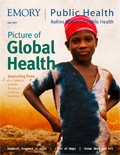Responding to public health crises

The Emory PERRC will inform local, state, and national efforts to determine how best to prepare for public health crises.
The RSPH is broadening its efforts to enhance how communities respond to public health crises.
|
In Brief Rollins-teers honored for community service |
Using $1.5 million in the first year of a five-year $9.3 million grant from the CDC, the school established the Emory Preparedness and Emergency Response Research Center (PERRC). Interdisciplinary in scope, the Emory PERRC involves project directors and researchers in epidemiology, health policy and management, emergency medicine, bioinformatics and biostatistics, ethics, law, business, and other disciplines. Through various research projects, experts will identify and hone the strategies, systems, and infrastructure needed to protect populations during emergencies. The center also is recruiting doctoral and postdoctoral students to become young investigators in the newly emerging field of public health systems research and preparedness.
“The Emory PERRC links academic expertise from across Emory with the needs of state and local health agencies, says Ruth Berkelman, the center’s director. “The federal government has made major investments in public health to increase our preparedness for public health crises, and we need to know what works and what doesn’t.”
Four multi-year projects are under way. James Buehler, research professor of epidemiology, is studying the design and use of incident command systems and emergency operations centers to prevent or control disease or injury. He also is working with state immunization managers and health care providers to improve strategies to address potential vaccine or medication shortages. Alexander Isakov, director of Emory’s Office of Critical Event Preparedness and Response and associate professor of emergency medicine, is examining how academic institutions can leverage their resources to partner with public health agencies in response to community crises. David Howard, assistant professor of health policy and management, heads a project to improve disaster planning for nursing home, home health, and dialysis providers.
In addition, the center has awarded two pilot project grants to Patrick Sullivan, associate professor of epidemiology, and Art Chang, associate professor of emergency medicine. These one-year grants enable new investigators to improve public health response in the face of disasters.
Rollins is among seven public health schools awarded PERRC funding by the CDC. The Emory PERRC builds on existing RSPH efforts to improve emergency preparedness. In 2000, the CDC funded the Emory Center for Public Health Preparedness (CPHP), one of several such centers nationwide. Led by Kathleen Miner, the Emory CPHP strengthens terrorism and emergency preparedness through education of public health professionals in Georgia. Berkelman also directs the Center for Public Health Preparedness and Research. Established by the O. Wayne Rollins Foundation following the anthrax attacks in 2001, the center conducts training and research in preparedness, response, and recovery from terrorism, infectious disease, and other threats.


